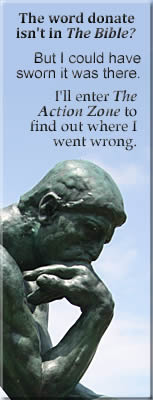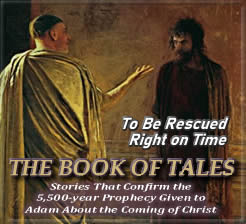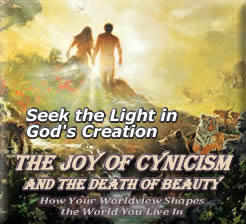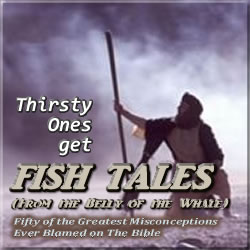The Hidden Books (Cont’d)
A Body of Wisdom (Cont’d)
One of the great tragedies in the history of The Bible is that there is so much ignorance in regard to the peculiar assumption that we as a Western Protestant people received our Canon of Scripture like some hermetically-sealed document handed down from On-High. Fortunately, though, for the sake of those with the courage to examine this critical aspect of history, the work of intrepid scholars has greatly aided in dispelling such myopic thinking. Among them are Cyrus H. Gordon, professor of ancient Near East studies at Brandeis University, whose work shed much-needed new light on this age-old controversy. Said Gordon:
The Bible is of a complex composition, varying in scope according to the different ecclesiastical bodies. The Samaritans include only the Five Books of Moses in their Bible, and it is evident from The Dead Sea Scrolls that before the start of the Christian Era The Pentateuch was the most stabilized part of the Hebrew Scripture. Normative Judaism embraces the conventional Pentateuch, Prophets and Hagiographa of the familiar Old Testament. The Septuagint, however, is far more inclusive, containing as it does, Apocrypha and Pseudepigrapha. Qumranite and other sectarian Jews possessed still other sacred writings. Protestant Bibles usually contain the normative Jewish Old Testament plus The New Testament; Catholic Bibles have, in addition, The Apocryphal Books. Various Eastern Orthodox Churches include different Pseudepigrapha. Accordingly, there is no one biblical corpus; and the component books of either Testament are in many cases extremely heterogeneous individually.1
Concerning the variegated process of the formation of our Protestant Bible, Edgar J. Goodspeed, described as “America’s greatest New Testament scholar,”2 pointed out:
The Apocrypha formed an integral part of the King James Version of 1611, as had all the preceding English versions from their beginning in 1382. But they are seldom printed as part of it any longer, still more seldom as part of the English Revised Version, and were not included in the American revision.
This is partly because the Puritans disapproved of them; they had already begun to drop them from printings of their Geneva Bible by 1600, and began to demand copies of the King James Version omitting them as early as 1629… We moderns discredit them because they did not form part of The Hebrew Bible, and most of them have never been found in any Hebrew forms at all.
But they were part of The Bible of the early Church, for it used the Greek Version of The Jewish Bible, which we call The Septuagint, and these books were all in that version. They passed from it into Latin and the great Latin Bible edited by St. Jerome about 400 A.D., The Vulgate, which became the authorized Bible of Western Europe and England, and remained so for a thousand years. But Jerome found that they were not in The Hebrew Bible, and so he called them Apocrypha, the hidden, or secret, books.3
The Apocrypha, however, does not contain all of the books included in the pantheon of apocryphal literature. Most notable among the other titles are The First Book of Adam and Eve, The First Book of Enoch, The Secrets of Enoch, The Book of Jasher, The Book of Jubilees, The Testaments of the Twelve Patriarchs, The Letters of Herod and Pilate, and The Gospel of Nicodemus.
Story Continues Below
Says Richard Price—the founder and CEO of Academia.edu—on his podcast In Depth With Academia:
The Book of Days: In Search of the 5,500-year Prophecy Given to Adam About the Coming of Christ is:
To hear Price’s book review of The Book of Days, CLICK HERE.
To hear Kent and Zen Garcia continue their discussion concerning the implications of the 5,500-year chronology from Adam to Christ as it pertains to the faithfulness of God, CLICK BELOW.
Story Continues From Above
Grounds for Exclusion
Over the years many reasons have been offered to justify the rejection of any book that is no longer found in many of our modern versions of The Bible. Chief among them are: One, they were written under assumed names; two, they contain historical errors; three, they were not quoted by Jesus; and four, they contain no prophetic elements. Yet ironically, these same objections, which seem to confirm the correctness of rejecting the apocryphal books, have also been leveled against the very books that reside in the accepted Canon of Scripture.
For example, regarding The Pentateuch, or the first five books of The Old Testament, critics have often doubted the Mosaic authorship of The Book of Genesis. As their argument goes: While the last four books could have been written by Moses by virtue of the fact that he lived during the years described by the text, he certainly could not have been around to witness the events depicted in the first book. Yet according to most biblical scholars: “Long before the first century A.D., Moses was declared the author of Genesis, and Josephus, the first-century Jewish historian, in keeping with this tradition, accepted Mosaic authorship.”4
Still other books in The Old Testament have had their authorship called into question, such as Isaiah, Ezekiel, and Daniel. Because they so precisely predict future events, these books, critics insist, must have been published after the fact and therefore must have been written under assumed names. Similarly, certain books in The New Testament have in recent times come under fire concerning their genuine authorship. Most notably are those attributed to the Apostles Peter and Paul. According to much modern-day scholarship, both epistles of Peter and several letters of Paul were allegedly written as amalgamations by authors other than the ones to which Scripture has subscribed. Yet the simple fact is, though the identities of many of the best-known biblical authors remain subject to such doubt and speculation, the books that bear their names are still regarded as integral to The Holy Bible.
As far as rejecting certain books because they contain historical errors, again I should point out that this same argument applies to texts well within the accepted limits of scriptural sanctity. And again one need only turn to the first book in Scripture to prove my point, because as many biblical scholars are well aware it has been a longstanding bone of contention that the account of Noah’s gathering of the animals into the Ark contains two contradictory versions. In one rendition, the animals enter in pairs, while in another, they enter in groups of seven.
The same thing occurs in The New Testament regarding Judas Iscariot, whose infamous demise is reported in two separate yet contradictory accounts. In Matthew, it is said that a grief-stricken Judas hung himself after betraying Jesus, while Acts has him falling headlong into a field and being disemboweled in the process. Naturally, scholars are quick to point out the various ways in which such contradictions can be logically reconciled, and justifiably so. Yet this still does not change the fact that there are obvious contradictions to be found in the received texts, which if they were found in books that critics were seeking to excise would be considered clear grounds for exclusion.








